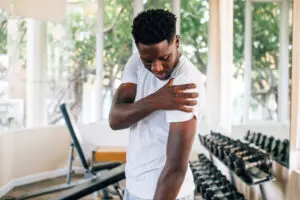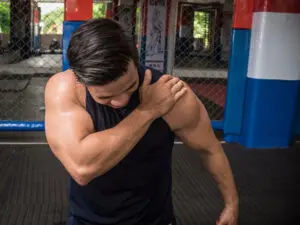There are those who lift weights as part of their exercise routine, and then there are the serious weight lifters. The second group are certainly more rigorous and set goals well beyond their own body weight. Whichever group you fit in to, take some care and pay close attention to 5 common shoulder injuries from weight lifting.
Practical Cautions
Be aware that even the most insignificant shoulder injury can limit your ability to do any upper body exercises. It’s possible to still reach your lifting goals and prevent injury by following a few common sense precautions.
Avoid training too much or too frequently. Slowly building up strength is best. Set a plan in place to steadily increase weights in small increments. No need to become “macho man (or woman)” overnight!
Symptoms Of A Shoulder Injury
If you experience sharp pain, your body is giving you a message. Start there.
All upper body exercise involves the shoulder and it is especially true of weight lifting. If you can’t raise your arm, rotate your arm, have swelling, redness, stiffness and pain, you have injured your shoulder. Many such injuries are related to inflammation.
Neck pain can also accompany shoulder injuries. Best practice is rest, ice, compression, and elevation (RICE). Take OTC non-steroidal anti-inflammatory meds.
If your symptoms do not improve, contact Dr. Koo.
Most Common Shoulder Injuries From Weight Lifting
- Biceps Tendonitis feels like a dull ache in the shoulder due to an inflammation of the biceps tendon.
- Inflammation of the fluid filled joint sac which helps to cushion the shoulder joint
- Rotator cuff tendonitis is an inflammation of the rotator cuff tendon which will be painful if you raise or rotate your arm
- Sprains or strains occur from over stretching or partial tearing of a ligament in the shoulder or tendons. You will feel pain with any movement.
- Partial or complete rotator cuff tear and labrum tear is a more serious injury. You will have severe pain and an appointment with Dr. Koo is necessary as soon as possible.
It can sometimes be difficult to tell the difference between normal after workout soreness and an actual injury, so if you experience redness, if the site is warm to the touch, swollen and/or painful, call Dr. Koo.
As always, if you have any further questions or would like to schedule an appointment, please call (425) 823-4000 or make an appointment online.





